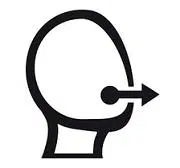 The etymological origin of dysarthria is found in a compound Greek word formed by the terms dys- ( "dis-" ) and árthron ( "joint" ). This word passed into scientific Latin as dysarthria , which came to our language as dysarthria .
The etymological origin of dysarthria is found in a compound Greek word formed by the terms dys- ( "dis-" ) and árthron ( "joint" ). This word passed into scientific Latin as dysarthria , which came to our language as dysarthria .
Dysarthria is a medical condition that refers to a problem articulating words . This problem appears with certain nervous diseases and is usually linked to injuries to the nervous system (peripheral or central).
Unlike aphasia , dysarthria is not a language disorder: it is a difficulty in speech . The individual who suffers from dysarthria cannot articulate the phonemes adequately.
The patient, in this context, may express himself with a strained voice and register alterations in the volume and tone of speech. Additionally, due to poor articulation, you may make sounds that do not exist on your tongue and have irregular breathing during the communication process.
Depending on its cause, it is possible to differentiate between multiple types of dysarthria. Cerebellar dysarthria , for example, arises from a problem in the cerebellum . Bulbar dysarthria , for its part, is related to damage to the medulla oblongata, while pseudobulbar dysarthria is associated with lesions in the pathways that connect the medulla oblongata to the cerebral cortex. Another type of dysarthria is parkinsonian dysarthria , a consequence of Parkinson's disease.
Treatment of dysarthria usually includes the participation of speech therapists, physiotherapists, neurologists and other specialists. In general, the aim is to strengthen the muscles involved in speech and achieve an improvement in respiratory capacity, among other things.
The specialists mentioned in the previous paragraph have different objectives in the long road involved in the treatment of dysarthria. With respect to neurologists, for example, these are the professionals who are in charge of identifying the origin of this pathology. Then speech therapists, occupational therapists and physiotherapists come into action, who must carry out speech rehabilitation work. Psychologists, for their part, must actively help patients to face the problems derived from dysarthria, such as depression and social isolation.
 Often, it is the family doctor or pediatrician who refers their patients to a neurologist as soon as they notice a symptom of dysarthria, unless there is a major pathology , such as cerebral palsy , that has been identified at the time of the diagnosis. delivery.
Often, it is the family doctor or pediatrician who refers their patients to a neurologist as soon as they notice a symptom of dysarthria, unless there is a major pathology , such as cerebral palsy , that has been identified at the time of the diagnosis. delivery.
To determine the areas that are affected by the disease and to what degree, the intervention of the speech therapist is essential. Having collected this data, it begins to develop a work plan that adjusts to the needs of each patient, which prioritizes these areas, so that the focus is on those that have the greatest impact on the individual's daily life. . Since this is a multidisciplinary collaboration, the speech therapist must coordinate with the other specialists.
One of the most important aspects of treatment is to keep people close to the patient adequately informed about the patient's characteristics and the way in which they can or should collaborate.
Both in the specialist's office and at home, the patient should treat the following four areas: speech, breathing, swallowing, and voice . For each of them, there are different easy-to-learn tips and activities that were designed to be practiced without medical supervision. Professionals are advised to give the patient all written instructions and monitor the patient's progress, always being open to modifying certain aspects of the treatment if necessary.
